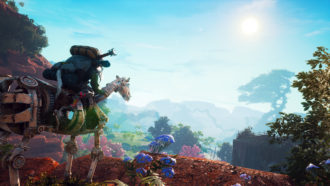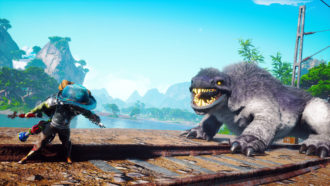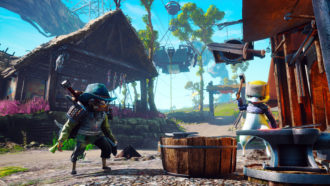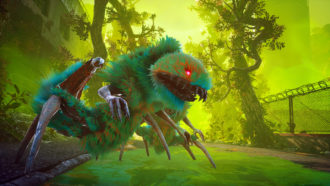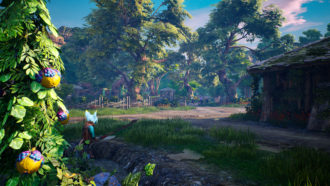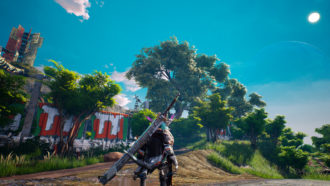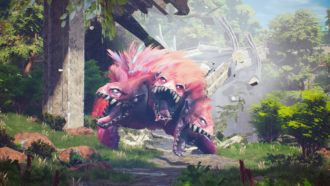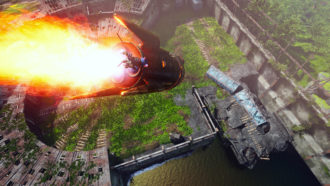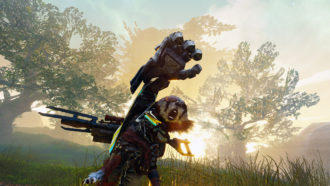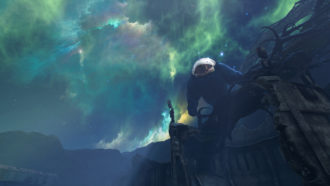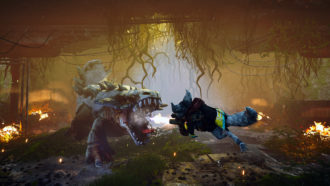Platforms:
Xbox One, PS4, PC
Released:
May 25, 2021
Publisher:
THQ Nordic
Developer:
Experiment 101
Biomutant was announced back in 2017 by a developer called Experiment 101, a team that comprised of former Avalanche Studios employees that had worked on the loved Just Cause series. While those games were at least grounded in reality with human characters and storylines, Biomutant feels like a breath of fresh air by comparison, featuring a cat-like creature that can be mutated and designed to your own aesthetic, with a lush and colourful setting that pops off the screen.
Described as an open-world, post-apocalyptic, Kung-Fu fable RPG, there are strange creatures to fight, several tribes to align with (or battle against), and the Tree of Life hanging in the balance, threatened by four world-eaters that must be stopped. With lots of RPG style progression, a varied combat system and lots of loot to uncover, Biomutant is set up for success in almost every way. The finished product is absolutely bursting with ideas and creativity, but the charming nature of the experience only takes you so far before its generic open-world checklist takes hold and its rough edges continue to show through.
Biomutant has a story full of choices that can impact the narrative path that you take, as you navigate making alliances with tribes who have their own ideas about what the current world should look like. In theory, this would make for a compelling story as you decide what’s right or wrong and make meaningful decisions. In reality, I didn’t feel any particular connection to the tribe I ended up working with, other than the fact it was the one that I chose at the beginning. Still, you go on your quest, attempting to take over (or convince) the other tribes to work with you. This is where the open-world clichés start to click into place, as the overworld map lights up with outposts that must be completed as you take over regions one at a time.
Stop me if you’ve heard this before; waypoints can be triggered and used for fast travel and you’ll stumble across side quests to complete that come with decent rewards and upgrades. You can also discover optional new locations to explore which means the possibility of discovering more new and rare loot which I always found to be a satisfying diversion. Handily, Biomutant doesn’t waste your time with these sections, letting you know exactly how many pieces of awesome gear are left to find so you aren’t exploring for diminishing returns. Overall, it relies heavily on tropes of open-world games in general, but this isn’t necessarily a bad thing, just something that keeps the experience from being next level, with only a few creative and unique ideas that separate it from the pack.
“…the ‘old world’ is referenced quite heavily, where humans lived and had all of their gadgets that are referred to in a comical and irreverent manner…”
After taking over a few of the outposts and knowing that there were more to come, Biomutant actually offered me the ability to skip those additional takeovers so that I could finish the quest right where I was, without requiring the extra effort. By that point, with several outposts under my control and what I assumed was a few more to go, it felt like even the game itself was like “look you don’t have to do this if you don’t want to”, which was interesting to say the least. Open worlds should be filled to the brim with exciting and intriguing things to do, but after around 15 hours or so in Biomutant’s world, I felt like I’d probably seen enough.
In terms of the setting itself, the “old world” is referenced quite heavily, where humans lived and had all of their gadgets that are referred to in a comical and irreverent manner which I appreciated. Biomutant is certainly not the first game with a post-apocalyptic setting used to theorise what us weird humans used things like TV’s and microwaves for, but there is a certain charm to discovering which “old world gadget” you would happen upon next, before hacking it for some sort of reward. Hacking itself I found to be an enjoyable rotation puzzle at first, but it doesn’t have much variety, and failing a hack just gives you a short zap which meant I didn’t feel any high stakes when stuffing it up.
That all being said, the world of Biomutant actually did grow on me over time. I liked discovering unique areas and meticulously scouring them for resources. Finding a sundial that then points to a mysterious spot on the map made for a nice change of pace from taking down outposts. Flashbacks to my character’s past as a young cat-thing gave me more insight into the world and made me feel a little bit more connected to the story. There’s some lovely themes and ideas in Biomutant that meant I wasn’t bored at any point, but there was a lot of “going through the open-world motions” as well.
There are many conversations to be had with the characters you come across in Biomutant with questions that you can ask that have impact based on your charisma. Unfortunately, these characters just don’t possess the same level of nuance you might see in, say, a Bioware RPG. These interactions also amount to listening to gibberish sounds, while the David Attenborough-esque storyteller translates. It certainly makes sense that the creatures wouldn’t speak English necessarily, but having every creature translated by the same voiceover can feel a bit repetitive. I found him to be charming at the beginning, like a nature documentary was playing before my eyes, but I got completely sick of him after a couple of hours, opting to completely dial down his off-the-cuff commentary during my play sessions. The storyteller can also make it quite difficult to gauge the personalities of the characters you come across. It’s a shame, but he made me care less about them overall.
Of course, storytelling is merely one piece of this giant puzzle; your character itself can be upgraded in many different ways, so much so that it can all be a little overwhelming at first. There are Upgrade Points (from levelling up), Bio Points (collected in the world) and Psi Points (from shrines and making certain dialogue choices). Upgrade Points are used for “Wung Fu” to get new combat abilities, and are also used for perks. Mutations are your additional mutant-like abilities, such as an infection that triggers enemies to attack each other, or placing fungi on the ground which can then be used as launch pads. These points can also help with your resistance to heat, cold, radiation and biohazard, as certain parts of the map are practically inaccessible without some sort of resistance or completing optional side quests.
Psi powers are another ability set altogether, with cool powers like leaving a path of flames behind you when you dash or being able to teleport around for a tactical advantage. There’s even a light vs. darkness component which impacts the kinds of abilities you have access to, adding another layer to the character builds you could potentially focus on. It just feels like a lot to keep track of, and considering you can only assign four abilities at once, my focus was always split between the various options (with some taking lots of these points to collect and find). While some of the more expensive abilities were cool to muck around with, I mostly found that some of the earlier ones I acquired served me well enough throughout the entire experience, so tracking down more and more of these points just to increase the options I had didn’t seem necessary.
There’s also a whole crafting system that you can dabble with, and plenty of gear you can collect and upgrade too. Your mileage will vary on this as well; in fact, I found that I didn’t stop to craft or upgrade more than a handful of times during my whole playthrough, as the gear I kept finding was always marginally better than what I had. The menu system for this is also not super intuitive, so mostly it was a pain to navigate instead of feeling seamless. Perhaps crafting and upgrading is simply there for those who don’t want to spend time looking for superb loot? It certainly feels at times like the developers threw a bunch of ideas at the wall just to see what would stick.
Combat is a mix of the abilities listed above all rolled into one, as you juggle between Wung-Fu melee combat, Mutation abilities, Psi abilities and on top of all that, you can use ranged weapons to shoot your enemies too. The devs have spoken previously about the challenge of weaving together so many different combat elements in a way that makes sense, and I’d say that they’ve done a decent job. It is certainly fun to mix together the various abilities, even though the melee portion can often result in a lot of button mashing. If you take too much damage, creating distance from your enemies while you heal and keep taking pot-shots from a distance is a decent strategy, too. I never found combat to be particularly challenging, however; sometimes with annoying melee-focused mini-bosses, standing as far back as possible, dodging their throws and just shooting them until they dropped felt like a bit of a cop-out and is less fun, but still very effective with no real incentive to switch it up.
“At times it’s even gorgeous, as the sun trickles in over the hillsides onto the lush flora as you’re riding through with the wind in your fur.”
Eventually, Biomutant does evolve further to the point where you can access special machines to assist you. Mekton is one of the earlier ones you can wield, where you play in a mech that can suck up oil to clear your path and stomp on your enemies with ease. Later, you’ll unlock a speedboat, and eventually the giant hand that you’ve probably seen in the trailers. These different machines switch things up, but are usually introduced to take down a specific boss, and are not required afterwards (although it’s still fun having access to them).
Stylistically speaking, Biomutant is a mixed bag. In combat, onomatopoeia is all over the place when hitting your enemies like a comic book come to life. It can be an incredibly pretty game, with lots of colour and detailed environments. At times it’s even gorgeous, as the sun trickles in over the hillsides onto the lush flora as you’re riding through with the wind in your fur. Monster designs are also really eye-catching, with big colourful-yet-awful looking creatures that look somehow cute and threatening at the same time.
Despite these positive visual flourishes, it also feels decidedly “last-gen”, with frame rate dips, pop-in and textures not always loading correctly, muddying what is otherwise a visually impressive title. While the vast open-world was a joy to explore, the game also has a habit of ferrying you into underground dungeons and sewers that are bleak and boring instead. It would have been nice to see some more creativity with those portions of the map, as it lets the experience down a little.
6
Decent
Positive:
- A large open world to explore with lots of fun distractions
- At times, it's visually gorgeous and compelling
- Lots of unique ideas, mixed combat and various systems to tinker with
Negative:
- Open-world tropes are a little hard to ignore
- Storytelling isn't strong due to annoying narration
- Frame-rate dips and pop-in keep it feeling "last-gen"
- Feels like it has too many systems it's trying to juggle at once
Biomutant is full of creative ideas and unique thoughts that, when combined with such a gorgeous and compelling environment to explore, could have made for a top-tier experience that is easy to recommend. However, the fact that it has so many ideas crammed in that it almost feels like too much, and an open world that can feel very by-the-numbers, makes Biomutant a solid game that misses the mark almost as much as it hits the nail on the head. The storytelling can be strong at parts, but is let down by the annoying narrator. Combat is deep and complex on paper, but feels simple and a bit repetitive in practice. It keeps telling you that choices you make matter, but they don’t feel like they matter. There is a certain amount of charm to the whole experience that kept me engaged until the credits rolled, and there’s a lot of whimsy in its worldbuilding, despite being rough-around-the-edges at times. For fans of open-world adventures with a twist, there is a lot to like here, but with a bit more refinement, Biomutant could have been something far more special.
